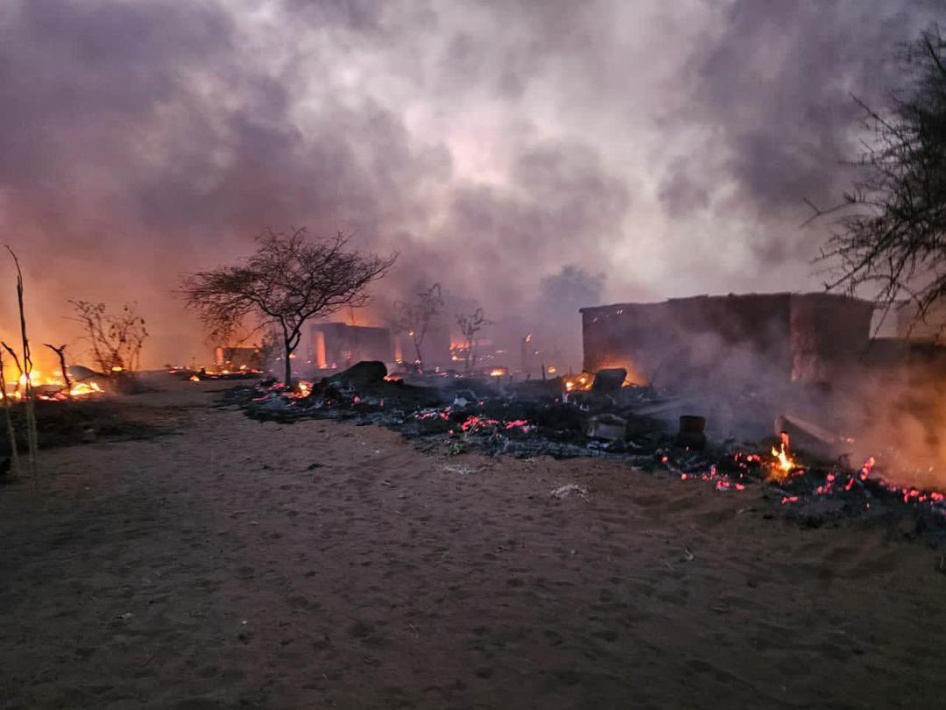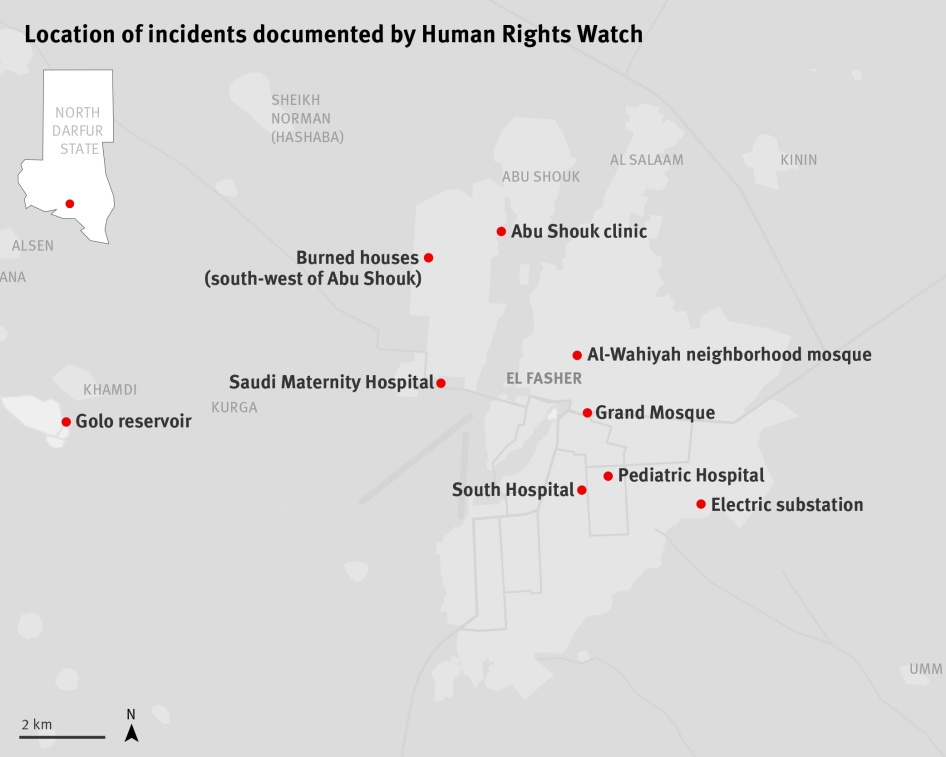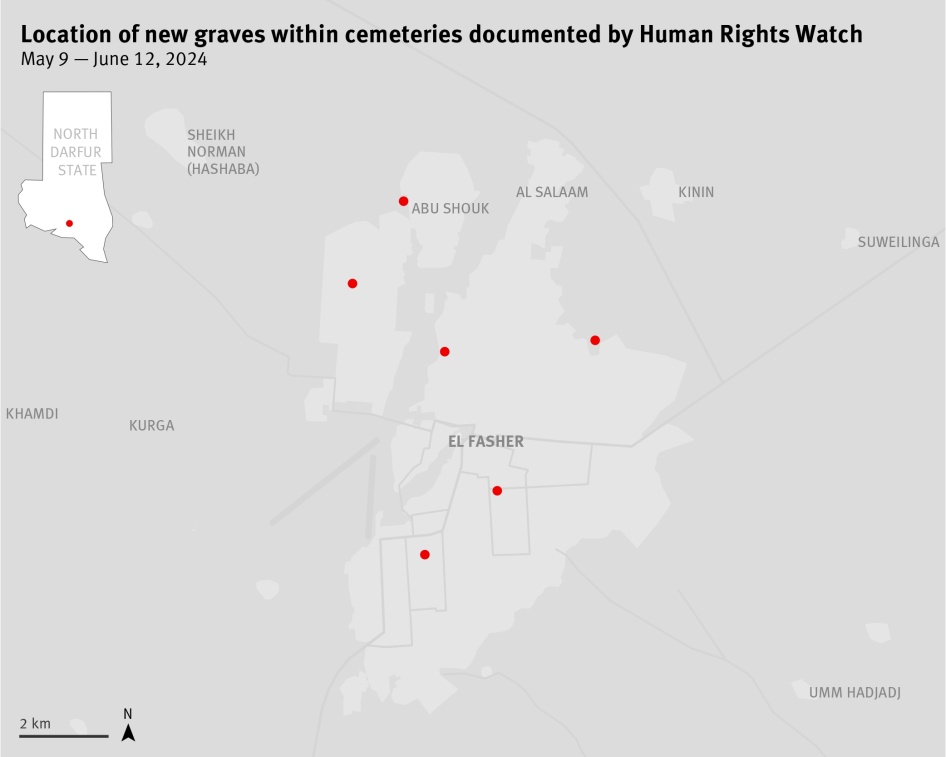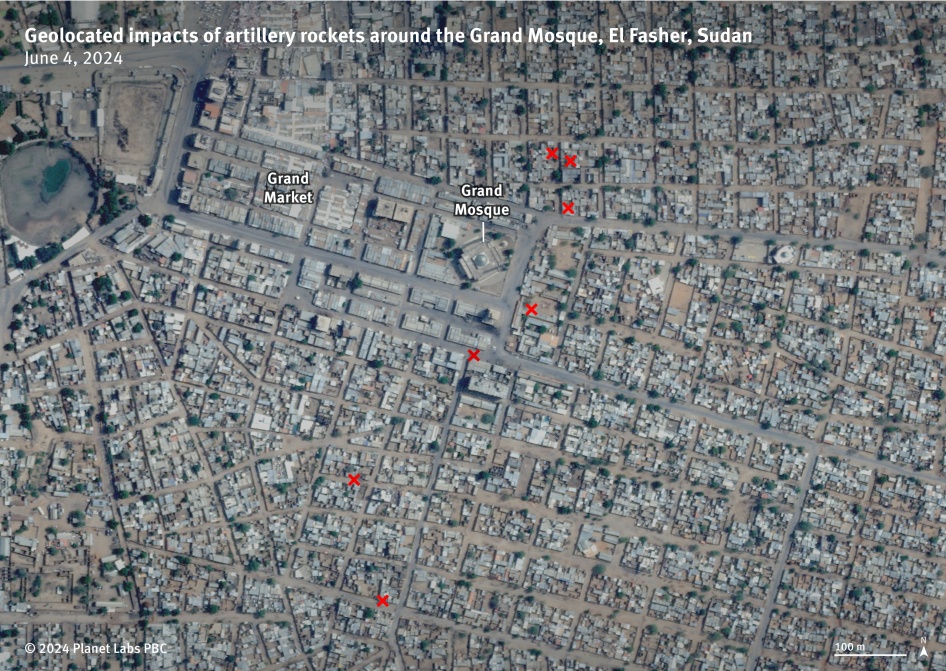(Nairobi) – Sudan’s warring parties’ recent unlawful attacks in North Darfur’s El Fasher have killed hundreds of civilians and forced tens of thousands to flee, as thousands in and around the city face starvation, Human Rights Watch said today. The United Nations secretary-general should act on the UN Security Council’s resolution 2736 and urgently work with the African Union (AU) to deploy a civilian protection mission. Governments should support the International Criminal Court (ICC) prosecutor’s investigation into apparent war crimes and other atrocities in Darfur.
“Since mid-May, Sudan’s warring parties have pounded populated areas of El Fasher with no apparent regard for the civilians there, while the Rapid Support Forces are burning down residential areas and deliberately targeting hospitals,” said Mohamed Osman, researcher for the Africa division at Human Rights Watch. “The UN and AU urgently need to act to protect civilians.”
Clashes in El Fasher between the Rapid Support Forces (RSF) and their allied militias against Sudanese Armed Forces (SAF) and their allied joint forces escalated in mid-May. Médecins Sans Frontières (Doctors without Borders, MSF) said that the South Hospital, the city’s only critical care facility, and subsequently the Saudi hospital received 1,418 wounded between May 10 and June 11, 2024; 226 of whom died. Many others could not reach the hospitals.
On June 8, Rapid Support Forces attacked South Hospital. Fighters entered the hospital shooting, forcing patients, their relatives, and medical staff to flee. A Health Ministry official said the RSF beat him and two other doctors. The forces also looted medical supplies and equipment. The hospital was forced to close.
Videos posted to Telegram on June 9 for which Human Rights Watch identified the location, show RSF fighters inside the hospital compound. In one, an RSF fighter sits in an ambulance by the entrance. Attacks directed at a medical facility, which is a civilian target, constitute a war crime.
The South Hospital had been hit at least four times by explosive weapons from May 25 to June 3, killing a total of 2 patients and wounding 14. Médecins Sans Frontières reported that a mortar shell landed in the antenatal care unit on May 25. It said that a shell landed in another part of the hospital on May 26,also damaging the hospital and the ambulance. Satellite imagery from the next day shows an impact crater consistent with indirect fire, such as mortars or artillery, inside the compound. On May 31, shelling impacted the south wall of hospital compound, no casualties were reported. Médecins Sans Frontières said that on June 3, shelling and shooting killed one patient and wounded another, and damaged the hospital’s water tank.
Both warring parties have engaged in heavy fighting in and around the Abu Shouk internally displaced people’s camp in northwestern El Fasher. Based on videos uploaded to X, Human Rights Watch verified the presence of RSF forces on the eastern edge of Abu Shouk camp as early as May 22.
On June 8, following fighting in its vicinity, at least one mortar projectile and two other explosive weapons hit an emergency clinic run by volunteers in the southern part of Abu Shouk, a witness said. The attack injured four or five people inside, including volunteer health workers and a child of one volunteer. Three people said the projectiles came from the east, where the RSF are based. Human Rights Watch was not able to confirm the direction.
A video analyzed and geolocated by Human Rights Watch show the stabilization fins of a mortar projectile in the clinic wall, and damage to its walls and corrugated iron roof.
Videos posted on June 9 on the Facebook page of the Abu Shouk Emergency Room show injured children, including reportedly injured from shelling and clashes on June 8.
Following heavy clashes on May 22 between the RSF and joint forces, a local responder said that the RSF shelled the camp and its surrounding areas, and rounded-up and beat youth. Satellite imagery from May 23 shows new burned houses southwest of Abu Shouk camp. A verified video uploaded to X on May 23 shows houses in that area engulfed in flames. A voice says: “Today’s shelling by the RSF forces in the Abu Shouk camp. At least 10 artillery shells today.”
Human Rights Watch’s analysis of satellite imagery shows an increase in graves in at least six cemeteries in the city from May 9 to June 12, notably in Abu Shouk camp, and in the area to the southwest that came under attack on May 22.
Thousands of houses have been destroyed by fire, notably by arson, since the fighting began in April, notably in the eastern part of the city in residential areas with traditional housing. In May, Human Rights Watch geolocated videos posted online that show RSF soldiers close to residential areas ablaze. The use of arson is consistent with the RSF and allied militias’ attacks in West Darfur state in 2023. As of June 12, 43 villages near El Fasher have been reportedly affected by fire.
Both forces have used explosive weapons with wide-area effects – including mortars, artillery rockets, and air-delivered munitions in the case of the military – in populated areas across the country. Use of these weapons can frequently result in indiscriminate attacks that violate the laws of war.
Two videos geolocated by Human Rights Watch show RSF soldiers using a 9M133 Kornet portable anti-tank guided missile. In one, the missile is fired from a hill east of El Fasher, toward the city. In the second, the missile is fired from a pick-up truck inside residential areas in the eastern part of the city.
A video shared on social media on June 16, verified and geolocated, shows Grad-type artillery rockets hitting neighborhoods in central El Fasher around the Grand Market and the Grand Mosque. Satellite imagery and shadows analysis show that the attacks occurred on the afternoon of June 3. Analysis of the video shows that the rockets were fired from north and northeast of the city, where RSF artillery positions are based.
On June 11, social media reported heavy shelling in Tambasi neighborhood, killing several civilians, including reportedly eight volunteers in a soup kitchen, south of Baraka square. “I saw the smoke, people screaming and running, another shelling also happened in this Baraka square,” a witness said. “These young people were providing food to the IDP gathering sites in this area.”
At the end of May, the UN reported that fighting left parts of the city without electricity and water, a trend documented in Khartoum and elsewhere.
One video uploaded to X on May 26, shows an RSF commander and several fighters shutting off water pumping stations for El Fasher at Golo reservoir, east of the city. Human Rights Watch verified several photos and a video showing the military recapturing the station a few days later, claiming to restart the pump. Human Rights Watch was unable to confirm whether the pump was restarted, and the extent to which this reservoir supplied water to the city.
Human Rights Watch received reports that civilians fleeing toward Mellit, 60 kilometers north, through an area under RSF and its allies’ control, were stopped, searched, and on June 3, killed at the last checkpoint before Mellit town.
A UN refugee agency official said on June 11 that violence has displaced 150,000 people in and around El Fasher in the past two months. Since late May, many civilians have fled south toward the Zamzam camp for internally displaced people, or towards Tawila, controlled by the Sudan Liberation Army, Abdul Wahid forces, a Darfuri armed group.
On May 28, Darfur Governor Minni Minnawi, the leader of the Sudanese Liberation Army, part of the joint forces supporting the military, said that El Fasher residents should take arms to defend their “honor and property.” Media have reported an uptick in civilians arming themselves, fighting with the joint forces and popular self-defense groups.
The fighting has added to an already catastrophic humanitarian situation in the town, particularly for those already displaced. Media reported on June 13 that a preliminary analysis by the Integrated Food Security Phase Classification (IPC) projected that 15 percent of the population of El Fasher and Zamzam camp would face catastrophic food shortages by September, and that many could die of hunger.
In a May 21 resolution, the African Union Peace and Security Council said the AU High Level Panel on Sudan should work with the newly appointed AU special envoy for the prevention of genocide on a plan to protect civilians. On June 13, the UN Security Council adopted a resolution on El Fasher asking the secretary-general to make recommendations for the protection of Sudan’s civilians.
Both resolutions are long-awaited steps in the right direction, and now is the time to lay out a workable vision for a protection mission and deploy it, Human Rights Watch said. The UN Security Council should also act on findings of the UN Panel of Experts on Darfur, including on violations of the UN arms embargo by other countries, notably the United Arab Emirates.
On June 12, the ICC prosecutor called for cooperation and information on alleged international crimes in Darfur, including El Fasher. ICC member countries should provide the court with timely information, support arrest efforts, and ensure the court has the budget to deliver justice in Darfur as well as the other situations on the court’s docket.
“Darfuris have been pleading for protection for months,” Osman said. “The UN and AU leadership should examine all possible options and deploy a mission before it’s too late. Governments should support international investigations into these heinous crimes.”









